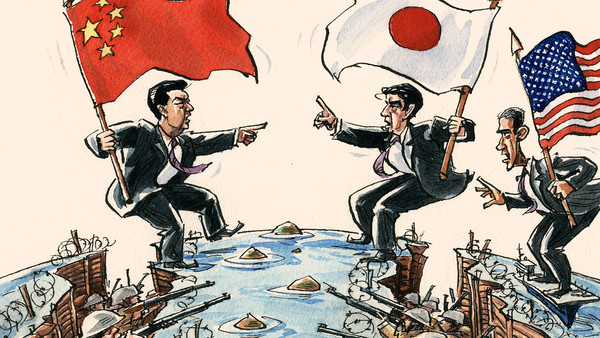
The original intention of Shinzō Abe’s visit to the United States was to strengthen the Japan-U.S. alliance, gain support from the U.S. in Japan’s dispute with China and achieve a breakthrough in the peace constitution, lifting the ban on “collective self-defense” (a defensive strategy that involves using allied countries to help defend one’s own country). Surprisingly, Japan has already been informed in advance that, if President Obama decides to support Japan’s plan to lift the ban on collective self-defense, the move could stimulate opposition from China. Abe must also decide whether to join the Trans-Pacific Strategic Economic Partnership Agreement.
This cold manner, more than Beijing’s hazy weather, showed on Abe’s gray head and face. He understood that in this atmosphere, as long as China does not make the first move, the United States will not support Japan’s move. Abe can only watch as China’s boats and planes, on official business, move freely into the water and air space of the Diaoyu Islands. He can’t be surprised that China’s warships and planes are once again shrouding Japan’s own warships and planes.
Just a few days ago, Japan’s Kyodo News questioned whether Obama would support Japan and the amendment of its constitution to end the ban on Collective Self-Defense during the summit meeting. If Obama chooses to support Japan, this will be a step forward for Japan-U.S. relations.
On the United States’ side of this issue, if Obama does choose to support Japan, China will likely see this as the joining of hands between Japan and the U.S. and will feel pressured. The United States believes if China’s attitude toward Japan continues to be tough, tension will intensify and may lead to instability in the region. That would benefit neither Japan nor the U.S. On Japan’s side of this issue, Abe and Obama could speak with the China’s Communist Party about restraining its attitude, but the U.S. State Department may have a negative reaction to this idea, as it may have a bad influence on U.S.-China relations.
Actually, considering the United States’ role in bringing international order after World War II, how can it so easily overthrow Japan’s idea to formulate peace? In addition, if Japan joins the Trans-Pacific Strategic Economic Partnership Agreement, it will accrue major benefits. It is impossible to satisfy America’s desires, too. I am afraid that this is the contradictory nature that makes up U.S.-Japan relations.

Leave a Reply
You must be logged in to post a comment.